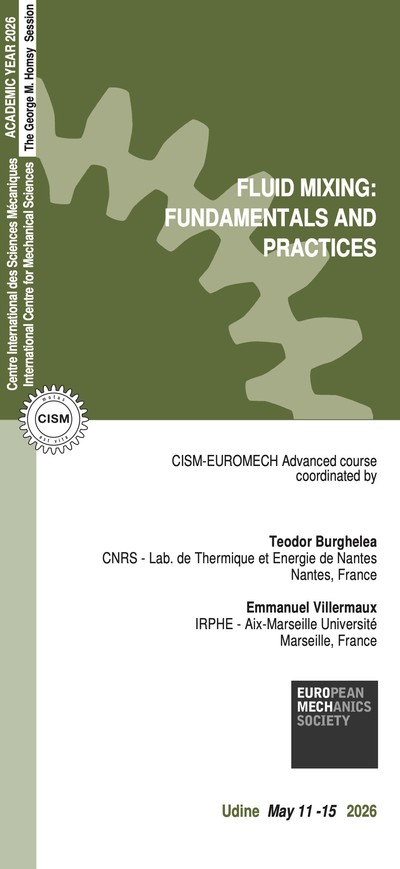The term “complex fluids” refers to a broad class of liquids and soft materials with complex microstructure; examples are polymer melts or solutions, gels, colloidal pastes, foams, emulsions, surfactant solutions, slurries, and many others. Depending on their microscopic structure, the macroscopic behaviour of these fluids can exhibit significant differences with respect to simple fluids such as water or air. From the macroscopic point of view of continuum mechanics, their behaviour is usually described using non-Newtonian constitutive models, where the stress tensor is a generic function of the velocity gradient tensor and its derivatives, although in several cases the continuum approach is not sufficient to capture its phenomenology, and molecular models must be used. The recent decades witnessed a fast-growing interest in complex fluids, largely driven by their relevance in a multitude of practical applications, such as painting, advanced manufacturing, food processing, cosmetics and personal care products, and many others. Moreover, with a better understanding of the microscopic structure of complex liquids, industries have realized that working fluids can be tailored specifically to optimize existing industrial processes, by altering their formulation (e.g., by means of chemical additives) in such a way as to change one or more physical properties. An example of industrial optimization is the use of polymer additives in agrochemical formulations, which improves the application efficiency of agrochemical sprays and reduces the environmental impact from ground contamination. In this context, a detailed understanding of the mass, momentum, and energy transport mechanisms in complex fluids is very important and has a significant impact on everyday practical applications.
The aim of this course is to provide a thorough overview of transport phenomena in complex fluids, based on the most recent research results and the most updated methods for their analytical prediction and numerical simulation. Lectures will cover several topics, including: a description the structural features of the most common complex fluids (polymer and surfactant solutions, colloidal suspensions); an introduction to the most common non- Newtonian constitutive models and their relationship with the fluid microstructure; a detailed overview of the experimental methods to characterise the thermophysical properties, the bulk rheology, and the surface properties of complex fluids; a comprehensive introduction to heat, mass, and momentum transport, and to hydrodynamic instabilities in complex fluids; an introduction to state-of-the-art numerical methods to simulate complex fluid flows, with focus on the Smoothed Particle Hydrodynamics (SPH) and the Dissipative Particle Dynamics (DPD) techniques. A number of lectures will be dedicated to an in-depth description of phenomena such as thermal convection, elastic turbulence, mixing of complex fluids, thermophoresis, sedimentation, non-Newtonian drops and sprays. The course is addressed to research scientists and professionals, engineers, R&D managers and graduate students in the fields of Engineering, Chemistry, Biology, Medicine, Applied and Fundamental Sciences. Participants will be given the opportunity to present their own research, and discuss their individual challenges and results with the instructors during a round table at the end of the course.
T. Burghelea, E. Segre, I. Bar- Joseph, A. Groisman, V. Steinberg, Chaotic flow and efficient mixing in a microchannel with a polymer solution, Phys. Rev. E, vol. 69, no. 6, pages 066305–8, 2004.
Z. Kebiche, C. Castelain, T. Burghelea, Experimental investigation of the Rayleigh– Bénard convection in a yield stress fluid, Journal of Non-Newtonian Fluid Mechanics, vol. 203, pp. 9 – 23, 2014.
V. Bertola, Dynamic welting of dilute polymer solutions: the case of impacting droplets, Advances in Colloids and Interfaces, vol. 193- 194, pp. 1-11, 2013.
V. Bertola, E. Cafaro, Thermal instability of viscoelastic fluids in horizontal porous layers as initial value problem, International Journal of Heat and Mass Transfer, vol. 49(21-22), pp. 4003-4012, 2006.
G. Brenn, G. Plohl, The Formation of Drops from Viscoelastic Liquid Jets and Sheets−An Overview, Atomization and Sprays, vol. 27(4), pp. 285-302, 2017.
M. Stelter, G. Brenn, A.L. Yarin, R.P. Singh, F. Durst, Investigation of the elongational behavior of polymer solutions by means of an elongational rheometer. J. Rheology, vol. 46, pp. 507-527, 2002.
M. Stelter, G. Brenn, F. Durst, The influence of viscoelastic fluid properties on spray formation from flat fan and pressure swirl atomizers. Atomization and Sprays, vol. 12, pp. 299-328, 2002.
M. Ellero, M. Serrano, P. Espanol, Incompressible smoothed particle hydrodynamics, Journal of Computational Physics 226(2), pp. 1731-1752, 2007.
S. Litvinov, M. Ellero, X. Hu, N.A. Adams, Smoothed dissipative particle dynamics model for polymer molecules in suspension, Physical Review E 77(6), 066703, 2008
A. Vazquez-Quesada, M. Ellero, Rheology and microstructure of non-colloidal suspensions under shear studied with smoothed particle hydrodynamics, Journal of Non-Newtonian Fluid Mechanics 233, pp. 37-47, 2016.
S. Buzzaccaro, A. Tripodi, R. Rusconi, D. Vigolo, R. Piazza, Kinetics of Sedimentation in Colloidal Suspensions. Journal of Physics: Condensed Matter, vol. 20, 494219, 2008.
R. Piazza, Settled and unsettled issues in particle settling, Rep. Progr. Phys. 77, 056602, 2014.
6 lectures on: Complex fluids – microscopic structure and constitutive models; surface tension and surface rheology in complex fluids; non-Newtonian drop impact phenomena; thermal convection in complex fluids.
6 lectures on: Transport phenomena: heat, mass, momentum transfer in complex fluids; hydrodynamic instabilities in complex fluids; atomization and sprays in complex fluids.
7 lectures on: Introduction to transport phenomena in complex fluids; introduction to rheology and rheometry (rotational and extensional measurements); mixing in complex fluids; elastic turbulence.
6 lectures on: Numerical methods – Smoothed Particle Hydrodynamics; Dissipative Particle Dynamics; applications of SPH and DPD to the simulation of complex fluids: continuum viscoelastic flows, suspended polymers, microfluidics, particle suspension rheology, multiphase flows and emulsions, magnetic chains.
6 lectures on: Thermal forces and sedimentation in particle dispersions and complex fluids; Selective particles transport under temperature gradients in colloidal suspensions; Particle settling dynamics of a wide class of systems, ranging from simple colloids to active particles and biological fluids, from foams to gels.





